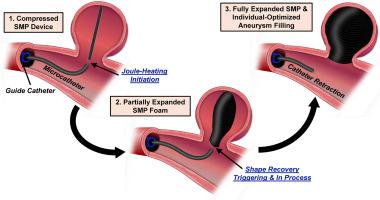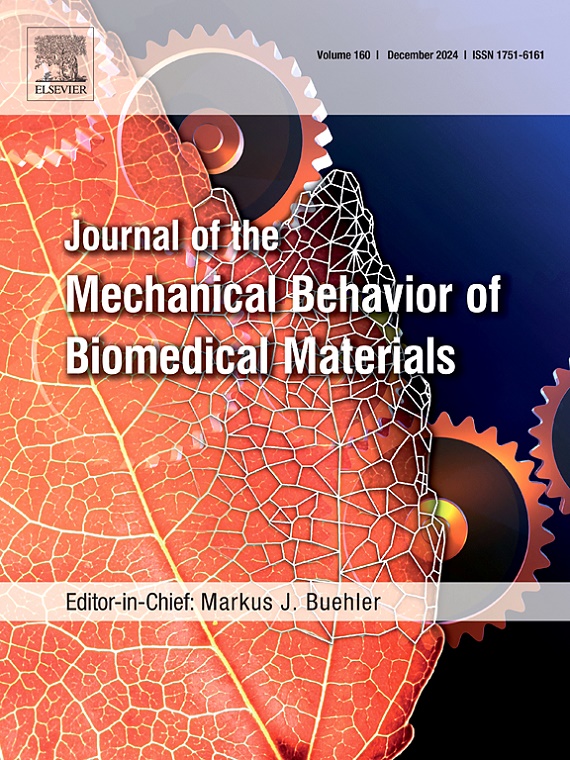为颅内动脉瘤的血管内治疗设计热可编程三维形状记忆聚合物设备。
IF 3.3
2区 医学
Q2 ENGINEERING, BIOMEDICAL
Journal of the Mechanical Behavior of Biomedical Materials
Pub Date : 2024-10-16
DOI:10.1016/j.jmbbm.2024.106784
引用次数: 0
摘要
尽管最近用于治疗颅内动脉瘤(ICA)的血管内栓塞装置取得了技术进步,但不完全闭塞和动脉瘤再通畅仍然是严峻的挑战。基于形状记忆聚合物(SMP)的装置可根据患者特定的动脉瘤几何形状进行制造和定制,具有克服金标准(血管内旋切)治疗效果不理想的潜力。在这项工作中,我们提出了一种通过三维打印技术制造的高多孔性患者特异性 SMP 栓塞装置,以优化动脉瘤闭塞,从而提高血管内治疗的长期疗效。为了便于通过焦耳热在动脉瘤处部署装置,我们引入了一层稳定、均匀的聚吡咯(PPy)涂层,以增强 SMP 材料的导电性。我们使用自制的脉宽调制电路诱导焦耳加热,并对涂有聚吡咯涂层的 SMP 栓塞装置的形状恢复进行了表征。我们发现,所采用的 PPy 涂层可增强导电性和导热性,而对 SMP 材料的玻璃化转变温度仅有轻微改变。此外,通过一系列参数研究,我们确定了催化剂浓度和吡咯聚合时间的组合,从而获得了理想的形状恢复特性,适用于 ICA 血管内治疗。总之,这些研究结果凸显了未来无线圈、个性化形状记忆聚合物(SMP)栓塞装置的材料涂层前景广阔,可实现动脉瘤的持久、完全闭塞。本文章由计算机程序翻译,如有差异,请以英文原文为准。

Design of thermally programmable 3D shape memory polymer-based devices tailored for endovascular treatment of intracranial aneurysms
Despite recent technological advancements in endovascular embolization devices for treating intracranial aneurysms (ICAs), incomplete occlusion and aneurysm recanalization remain critical challenges. Shape memory polymer (SMP)-based devices, which can be manufactured and tailored to patient-specific aneurysm geometries, possess the potential to overcome the suboptimal treatment outcome of the gold standard: endovascular coiling. In this work, we propose a highly porous patient-specific SMP embolic device fabricated via 3D printing to optimize aneurysm occlusion, and thus, improve the long-term efficacy of endovascular treatment. To facilitate device deployment at the aneurysm via Joule-heating, we introduce a stable, homogeneous coating of poly-pyrrole (PPy) to enhance the electrical conductivity in the SMP material. Using an in-house pulse width modulation circuit, we induced Joule-heating and characterized the shape recovery of the PPy-coated SMP embolic devices. We found that the employed PPy coating enables enhanced electrical and thermal conductivity while only slightly altering the glass transition temperature of the SMP material. Additionally, from a series of parametric studies, we identified the combination of catalyst concentration and pyrrole polymerization time that yielded the shape recovery properties ideal for ICA endovascular therapy. Collectively, these findings highlight a promising material coating for a future coil-free, personalized shape memory polymer (SMP) embolic device, designed to achieve long-lasting, complete occlusion of aneurysms.
求助全文
通过发布文献求助,成功后即可免费获取论文全文。
去求助
来源期刊

Journal of the Mechanical Behavior of Biomedical Materials
工程技术-材料科学:生物材料
CiteScore
7.20
自引率
7.70%
发文量
505
审稿时长
46 days
期刊介绍:
The Journal of the Mechanical Behavior of Biomedical Materials is concerned with the mechanical deformation, damage and failure under applied forces, of biological material (at the tissue, cellular and molecular levels) and of biomaterials, i.e. those materials which are designed to mimic or replace biological materials.
The primary focus of the journal is the synthesis of materials science, biology, and medical and dental science. Reports of fundamental scientific investigations are welcome, as are articles concerned with the practical application of materials in medical devices. Both experimental and theoretical work is of interest; theoretical papers will normally include comparison of predictions with experimental data, though we recognize that this may not always be appropriate. The journal also publishes technical notes concerned with emerging experimental or theoretical techniques, letters to the editor and, by invitation, review articles and papers describing existing techniques for the benefit of an interdisciplinary readership.
 求助内容:
求助内容: 应助结果提醒方式:
应助结果提醒方式:


